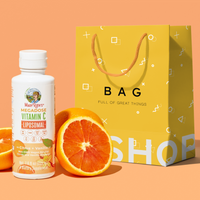
FEATURED
BY COLLECTION
FIND MARYRUTH'S IN STORE!

STORE LOCATOR
Now you can find your all-time faves and discover some exciting new products while you're out shopping.
GET STARTEDWhen it comes to supporting your overall health, it’s important to provide your body with the nutrients it needs to perform essential bodily processes. There are many important types of nutrients needed, including 13 specific essential vitamins our bodies cannot produce on their own.
One of these essential vitamins, B12, is a water-soluble vitamin that is a part of the group B-vitamins — which make up 8 of the 13 essential vitamins.
Let’s dive in to learn more about what B12 does and why you should take vitamin B12.
Vitamin B12 Benefits
Vitamin B12 is neuroprotective, as it is needed for the development and function of the body’s central nervous system. It also supports brain development and cognitive function, as well as aids the body in DNA synthesis and red cell production.
And — importantly for those who do not get enough of this essential vitamin — B12 provides energy to those who are deficient.
Vitamin B12 Deficiency
The FDA’s recommended daily intake of vitamin B12 for ages 4+ is 2.4 micrograms (mcg), though the amount of B12 you should take per day may vary depending on a number of factors.
Those who follow a diet in which they do not consume animal products, people with one or both MTHFR gene variants (which makes it difficult to absorb certain forms of B12), and individuals who have had surgery on their gastrointestinal tract are just some of the groups of people who can be at an increased risk of a vitamin B12 deficiency.
The body stores about 1,000 to 2,000 times more B12 than needed in a typical day, so the symptoms of a vitamin B12 deficiency may take several years to arise.
To find out if you have a vitamin B12 deficiency, you should consult with your physician or healthcare professional. They can help determine your nutrient levels so that you can make an informed decision on ways to support your vitamin B12 levels.
Foods With Vitamin B12
While vitamin B12 is naturally present in some foods, it’s mainly found in animal sources like beef liver, clams, tuna, and salmon.
For those that follow a vegetarian or vegan diet, this may make it difficult to incorporate foods that naturally contain B12. This means that vegans mainly must mainly get their B12 intake from fortified foods or supplements in order to support their vitamin B12 needs.
Vitamin B12 Supplements
Vitamin B12 is often referred to as cobalamin since it contains the mineral cobalt.
There are a few different forms of this vitamin, and many other B12 supplements may use artificial flavors and/or contain the form called cyanocobalamin, a synthetic form of B12 that contains cyanide.
MaryRuth’s B12 supplements contain the form of vitamin B12 called methylcobalamin, which is a preferred form for some with MTHFR gene variants (like MaryRuth herself!). Methylcobalamin also has superior bioavailability to cyanocobalamin, which means that your body will better absorb the vitamin.
For those looking for an easy way to supplement their B12 intake, our bestselling Organic Methyl B12 Spray contains 1500 mcg B12 per serving in an easy-to-take, delicious berry-flavored liquid spray.
Below are some of our bestselling products that also contain vitamin B12 in the form of methylcobalamin for target supplemental support.
However you choose to support your body’s vitamin B12 needs, MaryRuth’s is here to help you feel your best and have great health.
Health education made easy!
your shopping bag